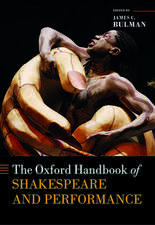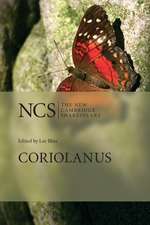Shakespeare and the Politics of Nostalgia: Negotiating the Memory of Elizabeth I on the Jacobean Stage
Autor Yuichi Tsukadaen Limba Engleză Paperback – 8 iul 2020
| Toate formatele și edițiile | Preț | Express |
|---|---|---|
| Paperback (1) | 163.86 lei 3-5 săpt. | |
| Bloomsbury Publishing – 8 iul 2020 | 163.86 lei 3-5 săpt. | |
| Hardback (1) | 566.28 lei 6-8 săpt. | |
| Bloomsbury Publishing – 24 iul 2019 | 566.28 lei 6-8 săpt. |
Preț: 163.86 lei
Preț vechi: 214.38 lei
-24% Nou
Puncte Express: 246
Preț estimativ în valută:
31.35€ • 34.17$ • 26.42£
31.35€ • 34.17$ • 26.42£
Carte disponibilă
Livrare economică 02-16 aprilie
Preluare comenzi: 021 569.72.76
Specificații
ISBN-13: 9781350175075
ISBN-10: 1350175072
Pagini: 232
Dimensiuni: 129 x 198 x 16 mm
Greutate: 0 kg
Editura: Bloomsbury Publishing
Colecția The Arden Shakespeare
Locul publicării:London, United Kingdom
ISBN-10: 1350175072
Pagini: 232
Dimensiuni: 129 x 198 x 16 mm
Greutate: 0 kg
Editura: Bloomsbury Publishing
Colecția The Arden Shakespeare
Locul publicării:London, United Kingdom
Caracteristici
It offers a masterful analysis of contextual sources which throw new light on the drama of Shakespeare and his contemporaries
Notă biografică
Yuichi Tsukada is Associate Professor of English at Doshisha University, Japan. He received his BA and MA from the University of Tokyo and his PhD from King's College London. His journal articles on Shakespeare have won him fellowships and awards, including the Young Scholar Award of Special Merit from the English Literary Society of Japan.
Cuprins
AcknowledgementsA Note on Texts Introduction 1 Macbeth: Performing a Caesarean Section on the Mother Country 2 Antony and Cleopatra: The Competition for Representing the Queen 3 Coriolanus: Disarming the Memory of Elizabethan England 4 Cymbeline: The Politics of Remembering the Besieged Heroine EpilogueBibliographyIndex
Recenzii
Tsukada (Doshisha Univ., Japan) offers a thoroughgoing political reading of four plays Shakespeare wrote in the period from 1606 to 1610: Macbeth, Antony and Cleopatra, Coriolanus, and Cymbeline. Tsukada views each work as reflecting aspects of the contemporaneous response to the death of Queen Elizabeth in 1603. Thus the "two Caesarean prophecies" in the Scottish play "dramatically stage the replacement of the diseased, barren mother with the fertile father in a way that recalls James's political vision of launching Jacobean England from Elizabeth's barren body politic" (p. 50). Tsukada demonstrates the vigor of debate in these years over Elizabeth: some authors looked back with nostalgia on her warlike female stance, whereas others mocked her courtly poses and preferred the pacific posture assumed by her successor. Some of Tsukada's readings have been offered before, as the fine full notes duly indicate; others will be new even to specialists. Shakespeare is seen as reflecting views of the age, unlike other writers cited, all of whom seem to come down on one side or the other of the debate. This volume will prove useful to those eager to ponder the merits and limits of such thoroughgoing political interpretation. Summing Up: Recommended.
This is an exciting re-evaluation of Shakespeare's engagement with the icon of Elizabeth I in his Jacobean plays. It examines the tropes of Elizabeth as a warlike queen, an imperilled princess and a bringer of peace as they were contested within Jacobean politics and culture. The book reveals a much more subtle and ambivalent response to Elizabeth by Jacobean Shakespeare than has previously been acknowledged.
Though Tsukada's book approaches the topic of Jacobean politics through an analysis of Shakespeare's work, it would be a good read for anyone interested in early modern politics and drama.
Yuichi Tsukada's insightful Shakespeare and the Politics of Nostalgia reexamines the dead queen's reputation during the early years of the reign of her successor. He does not seek, however, merely to read Shakespeare's characters as versions of Elizabeth, but to examine the plays' participation in debates about cultural memory and representation.
Through this engaging and methodical study, Yuichi Tsukada illustrates just how nebulous and complex the evocations of Elizabeth I could be in Jacobean drama. Although Shakespeare is the primary focus, the readings of other contemporary texts are also compelling and vividly, if briefly, drawn, and it is clear by the end of the study that the ghost of Elizabeth I would, contrary to the authors seeking to silence her, continue to haunt her successor and her country.
This is an exciting re-evaluation of Shakespeare's engagement with the icon of Elizabeth I in his Jacobean plays. It examines the tropes of Elizabeth as a warlike queen, an imperilled princess and a bringer of peace as they were contested within Jacobean politics and culture. The book reveals a much more subtle and ambivalent response to Elizabeth by Jacobean Shakespeare than has previously been acknowledged.
Though Tsukada's book approaches the topic of Jacobean politics through an analysis of Shakespeare's work, it would be a good read for anyone interested in early modern politics and drama.
Yuichi Tsukada's insightful Shakespeare and the Politics of Nostalgia reexamines the dead queen's reputation during the early years of the reign of her successor. He does not seek, however, merely to read Shakespeare's characters as versions of Elizabeth, but to examine the plays' participation in debates about cultural memory and representation.
Through this engaging and methodical study, Yuichi Tsukada illustrates just how nebulous and complex the evocations of Elizabeth I could be in Jacobean drama. Although Shakespeare is the primary focus, the readings of other contemporary texts are also compelling and vividly, if briefly, drawn, and it is clear by the end of the study that the ghost of Elizabeth I would, contrary to the authors seeking to silence her, continue to haunt her successor and her country.





















